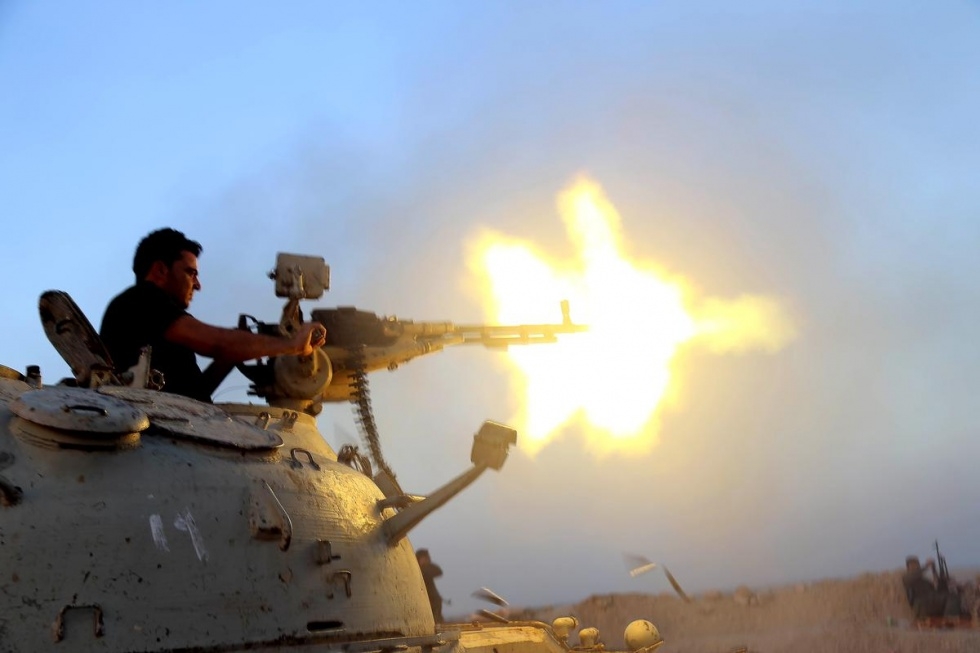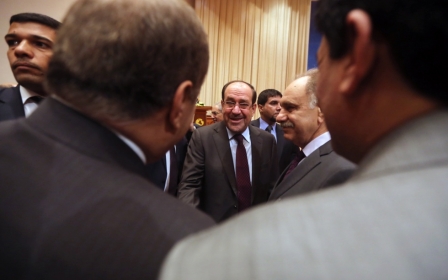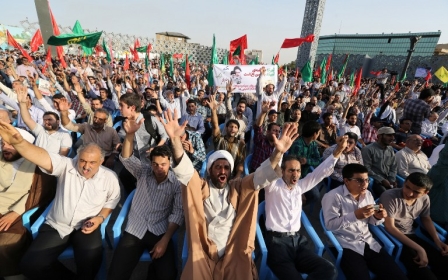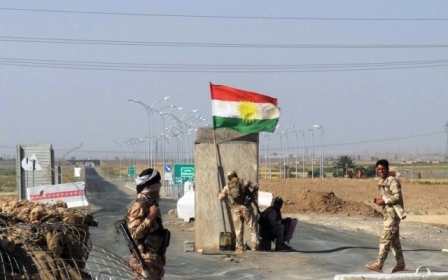Iraq delays key parliament session amid unrest

Iraqi leaders postponed forming a government for more than a month Monday as they delayed a crucial parliament session.
A swift militant advance, which has overrun swathes of territory across five provinces, has alarmed the international community and heaped pressure on Prime Minister Nuri al-Maliki as he seeks a third term in office.
Iraqi officials and a lawmaker, all speaking on condition of anonymity, said the parliament meeting was rescheduled for August 12 because MPs could not agree on a new speaker.
More than two months after elections in which Maliki's camp won the most seats, though not a majority, parliament has yet to progress on filling the top three positions, which are split between the Shiite Arab, Sunni Arab and Kurdish communities.
Despite telling AFP in a 2011 interview he would not seek a third term, Maliki vowed last week he would not bow to mounting international and domestic pressure to step aside and allow a broader consensus.
Washington insisted that uniting Iraq's sectarian factions was the only way to repel the advances by Sunni militants.
White House spokesman Josh Earnest said that Islamic State (IS) fighters posed an "existential threat".
Iraq army general killed by shelling
While Iraq has received military support including equipment, intelligence and advisers from the United States, Russia, Iran and even Shiite militias it once shunned, efforts to battle the militant offensive were dealt a blow when a senior general was killed on Monday.
Staff Major General Najm Abdullah al-Sudani, commander of the army's 6th division, was killed by "hostile shelling", Lieutenant General Qassem Atta told AFP by text message.
Sudani was killed west of Baghdad, near where security forces have been locked in a more than six-month standoff with militants who have seized the city of Fallujah.
Maliki attended Sudani's funeral along with acting defence minister Saadun al-Dulaimi and senior officers, the defence ministry said.
Security forces have for more than a week also tried to retake the Sunni stronghold of Tikrit from a loose alliance of IS fighters, other groups and former Saddam Hussein loyalists, but have so far failed to do so.
Iraqi forces have been hamstrung by a lack of combat experience and dearth of intelligence in Sunni areas, largely over distrust of the Shiite-led authorities among Sunni Arabs, analysts say.
'The army and the police are seen as sectarian'
"The army and the police are seen as sectarian... and therefore the Sunni community doesn't provide support or, crucially, intelligence to the security forces," said John Drake of the AKE Group security company.
"If you don't have good intelligence on the ground, your strikes are not precise, they involve collateral damage and casualties... making everything worse."
Many of the 21 people killed in air strikes carried out in Sunni-majority Salaheddin and Nineveh provinces on Sunday were said to have been civilians.
While most observers have argued Baghdad is not about to fall, violence there has continued.
In the latest attack, a suicide bomber struck the northern entrance to the Shiite-majority Kadhimiyah area on Monday, killing at least five people and wounding at least 13, officials said.
And while government forces were still looking for a major victory, IS militants appeared to be brimming with confidence.
Iraq Kurd secession bid faces major obstacles
Meanwhile, experts said Iraqi Kurd's secession would be fraught with danger, but that the threat of a vote is more likely a bargaining tool on a longer road to independence.
One of the biggest obstacles to Kurdish secession is money, with oil revenues from areas they control insufficient to pay for the region's numerous civil servants.
Kurdish independence has in the past been anathema to Turkey, which also has a sizeable Kurdish minority.
While the Kurds struggle for money, they are also financing an expensive campaign to keep a raging Sunni insurgency led by IS from their borders and out of disputed areas vacated by the retreating Iraqi army.
Kurdish politicians are fighting for key posts in Iraq's new government after April polls, indicating they are hedging their bets on independence.
With Turkish support uncertain, strained finances, insurgents at the door, and the possibility of revolt by Arabs in disputed lands that Kurdistan intends to fold into its realm, experts do not expect the birth of a new nation soon.
New MEE newsletter: Jerusalem Dispatch
Sign up to get the latest insights and analysis on Israel-Palestine, alongside Turkey Unpacked and other MEE newsletters
Middle East Eye delivers independent and unrivalled coverage and analysis of the Middle East, North Africa and beyond. To learn more about republishing this content and the associated fees, please fill out this form. More about MEE can be found here.




